All eyes on Mahmoud Khalil
Why is no one at UU talking about the political persecution of students in the US?

Why are we barely discussing the political persecution of Mahmoud Khalil at our universities? Maybe I'm stating the obvious, but shouldn't we be having a serious conversation about what this could mean for our academic and political freedoms?
I think we should, and I am actually disappointed that this isn't happening yet. I do not believe that we live in a European vacuum. I could be wrong, of course, but considering Dutch academics have already received the Trump questionnaire in their inboxes, I think I might be right. Peer reviews are welcome.
Political persecution and concentration camps
The political situation in the US has already escalated further, although it may be useful to start at the beginning.
Mahmoud Khalil lived on the campus of Columbia University, in New York, and was taken from his home by the ICE (the American equivalent of the Dutch Immigration and Naturalisation Service, IND) on the evening of March 8. He is married to an American citizen and therefore has a permanent residence permit (green card), but his permit has reportedly been revoked. Khalil was a spokesperson for the encampments at Columbia University and is alleged to have participated in ‘activities linked to Hamas’.
When his wife, who was eight months pregnant at the time, tried to visit him at the detention centre where he was being held, he was nowhere to be found. Hours later, she learned that Khalil had been transferred to a prison in Louisiana. You could call this incident a disappearance; if this had happened in another part of the world, Khalil would certainly be considered a political prisoner.
But things didn't stop with Khalil. Since his kidnapping, the list of activists who have been arrested or deported has grown. Some people have fled the country. Rümeysa Özturk, a PhD student at Tufts University, was surrounded by plainclothes officers and taken away in an unmarked car. Like Khalil, she is also accused of ‘supporting Hamas’. However, unlike others who have been targeted by the Trump administration, Rümeysa was not involved in protests for Palestine. She wrote an op-ed for the university newspaper alongside other students, calling on the university administration to sever ties with Israeli companies, among other measures.
Meanwhile, people who look South American have been arrested and deported without trial to the Centre for Terrorism Confinement (Cecot) in El Salvador. Some of them have residence permits or ongoing asylum proceedings. To be honest, I think Cecot is a concentration camp.
All in all, these are worrying events. Since Trump came back to power, the American government has been severely interfering in several areas. Considering Elon Musk's attempts to meddle in the German elections, that does not bode well for our part of the world either.

Mahmoud Khalil. Screenshot from a YouTube video
It could happen here, too
It may sound a bit hysterical to say that fascism is coming. I thought so myself a few years ago, but I must say it is becoming harder and harder to deny that something is going on. We like to think it can't happen because we have free values, democracy, and a few other buzzwords in the West, but then it happens in the US, and we tell ourselves that maybe it can happen there but not here, even though geopolitically we are the lapdog of ‘there’.
The US has carried out mass surveillance and has been locking people up without trial in Guantanamo Bay for years, under the guise of the 'war on terror'. But mass surveillance isn't something that only happens in the US. It happens here in the Netherlands as well, through the Intelligence and Security Services Act (known in Dutch as sleepwet). In addition, tens of thousands of people are wrongfully listed in police systems under terrorism codes.
Geert Wilders (the leader of PVV, the party that won the last parliamentary elections) has stated that he wants to deport pro-Palestinian demonstrators. But he has said the same about other groups as well, so it would probably be easier to make a list of who he doesn't want to deport. The doors to tracking down people with ‘wrong ideas’ were opened years ago, and the criminalisation of ideas has already begun (such as the attempt by the Dutch House of Representatives to make the slogan ‘from the river to the sea’ a criminal offence). Demonstrators are even being visited and intimidated by the police in their homes.
The totalitarian America we see today is not the result of a sudden change since the last elections. The foundations were laid years ago by McCarthyism[1] and the war on terror, for example. The legal basis for the deportations we're seeing now is from 1798. Fascism does not come out of nowhere; it has always been in the state's toolbox to be used in times of crisis.
That's why we should always remain vigilant about how certain rhetoric and laws can be used, and critical of what the state is allowed to do to ‘terrorists,’ ‘foreigners’, and ‘enemies.'
Terrorist sympathiser – until history proves you right
Mahmoud Khalil recently wrote an op-ed in which he explained how Columbia facilitated his kidnapping. As a university, we may not have sunk that low yet, but institutions that depend on the government usually follow the political climate sooner or later.
So far, the arguments put forward by UU against the demands of pro-Palestinian activists have been based on maintaining ‘decency’ and ‘dialogue’. As political pressure increases, I would not be surprised if this changes at some point into a total inflation of what it means to be anti-Semitic, as we have seen in the US and our own House of Representatives.
I believe that ‘decency’ and ‘dialogue’ are impossible when there is a genocide going on. There is no reasonable middle ground between ‘this is genocide’ and ‘this isn't genocide' (or even ‘this is genocide and that's okay’). Genocide is indecent, period.
I would like to see universities everywhere in the world take a stand against the persecution we are currently seeing in the US. It is not a hypothetical scenario that we will see this kind of persecution in other parts of the world. On the contrary, it is very likely. They already want to ban ‘from the river to the sea’ in the Netherlands! Is that anything less than a massive undermining of political freedom?
Freedom of expression is now being restricted by casting pro-Palestinian voices as supporters of terrorism. I believe that glorifying and defending ‘terrorism’ should be allowed under freedom of expression. After all, resistance during the Second World War was also framed as ‘terrorism’[2]. The same happened to anti-colonial resistance. In hindsight, the terrorists of yesterday are seen as heroes, even though many thought differently at the time. For those who need a reminder, Nelson Mandela was on the American terrorism list until 2008.
Who is the government to play thought police and draw a line at ‘defending/supporting terror’, only to claim later that the war crimes committed by the Israeli army in Gaza are not terror? It is ideologically inconsistent, hypocritical, and any institution that does not strongly oppose this undermines its credibility. It was never about combating anti-Semitism. If it were, the Dutch Lower House would have been more concerned about organisations such as the Nederlandse Volksunie (VNU), Geuzenbond, and now perhaps even Tesla and Twitter, instead of only worrying about Samidoun.
The movements against the wars in Vietnam, Korea, Afghanistan and Iraq have all been proven right in hindsight. At the time, however, they were all labelled ‘communists’, ‘terrorist sympathisers’, and ‘traitors’. What we are seeing now is nothing more than history repeating itself.
Maybe it's time to reconsider those ties
These recent events are worrisome in the academic context because they can lead to censorship, and that doesn't even have to be explicit. First and foremost, there is self-censorship: academics and activists fear reprisals not only from the university but also from the state and research funders. Things that are not punishable or controversial right now could become so in the future. Rümeysa Özturk couldn't have known that the op-ed she co-wrote would lead to her being kidnapped on the street by the state a year later.
The university can do little about what happens in the House of Representatives. What it can do is show that it will stand behind the rights and freedoms of students and academics when it matters. So far, it has not done so. The previous Executive Board called in the riot police to disperse every occupation (something I wrote about at the time), which does not inspire much confidence. The University of Amsterdam (UvA) went one step further by actively deploying rhetoric that justifies the persecution of student activists[3].
The path we are currently on does not lead to a good place. Ultimately, the motivation behind all this is to protect the Netherlands' ties with Israel. In my view, this makes these connections even more untenable than they already were.
There is no way to cooperate ‘ethically’ with institutions affiliated with a state that is committing genocide. Everything can be used as a weapon to drive Palestinians from their land, even reforestation. Collaborations that appear innocent at first glance can therefore still lead to further oppression in a roundabout way. The fact that those acknowledging and combating this reality in the US have been at the receiving end of harsh reprisals proves that the finger is on the sore spot.
A judge in Louisiana recently ruled that Mahmoud Khalil can be deported, arguing that Khalil's actions would have ‘negative consequences for American foreign policy’, which made a deportation 'reasonable.’ Legal proceedings are still ongoing, so the fight is not over, but I hope that everyone at Dutch universities is well aware of the gravity of the situation. If we do not want this to happen here, now is the time to take action and stop looking away.
[1] This is also reflected in the questionnaires sent to researchers.
[2] This point may come as a bit of a surprise. I don't want to make a direct comparison with fascist states during the Second World War, but I also do not think that the situation has to be that bad before the state's judgment loses legitimacy. An oppressive state often tries to cover up its repression, so the seriousness of the situation is often something that only becomes fully apparent afterwards. For this reason, a certain degree of public distrust is always necessary.
[3] The ‘four million in damages’ that they presented to the media consisted largely of renovation delays and other items such as ‘compensation for lost revenue from the caterer,’ not direct damages caused by the demonstrations. The amount is exaggerated to arouse moral indignation against students, while the escalations by the UvA Executive Board and the riot police created the situation in which security services lost control and chaos ensued.
Sara is a blogger for DUB's Dutch page and often writes about issues that affect her and other students. The opinions expressed above belong to the author and do not necessarily represent DUB's views.